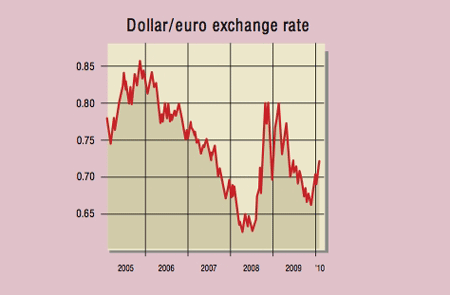How to profit from the rising dollar
With market sentiment wavering, the dollar rising again - up more than 3% on its January low. How can investors take advantage?

Get the latest financial news, insights and expert analysis from our award-winning MoneyWeek team, to help you understand what really matters when it comes to your finances.
You are now subscribed
Your newsletter sign-up was successful
Want to add more newsletters?

Twice daily
MoneyWeek
Get the latest financial news, insights and expert analysis from our award-winning MoneyWeek team, to help you understand what really matters when it comes to your finances.

Four times a week
Look After My Bills
Sign up to our free money-saving newsletter, filled with the latest news and expert advice to help you find the best tips and deals for managing your bills. Start saving today!
It's like 2008 all over again. At the height of the credit crisis, the dollar, the world's 'safe-haven' currency, rallied 35%. It then retreated in 2009 as riskier assets shot back up. Now, with market sentiment wavering, the DXY dollar index is rising again, and is up more than 3% on its January low. How can investors take advantage?
Currencies are always traded in pairs. So other currencies will fall as the dollar rises. But which should you bet against? Enter the euro. US GDP growth beat forecasts last week, with a 5.7% reading for the fourth quarter. That may not last, but it looks good compared to the eurozone, which is battling rising unemployment (now over 10%) and flat growth (0.4%). But the real issue is sovereign debt. In Greece, public debt is expected to exceed 100% of national output by 2011, says S&P. So the ratings agency has downgraded the country's debt rating twice in the last 12 months. And given that, against the dollar, the euro is still around 12% overvalued in purchasing power terms (this adjusts for differences in prices between countries), it is the best currency to short against the greenback.
One way to do this is via an exchange-traded currency (ETC), introduced to London by ETF Securities in November. The ETFS Sterling Short EUR Long USD (LSE: SEUP) is up 7% since then. This ETC tracks a Morgan Stanley currency index. It's "similar to investing in a foreign currency bank account, but less risky", according to ETF Securities. But we have some doubts about how useful it is.
MoneyWeek
Subscribe to MoneyWeek today and get your first six magazine issues absolutely FREE

Sign up to Money Morning
Don't miss the latest investment and personal finances news, market analysis, plus money-saving tips with our free twice-daily newsletter
Don't miss the latest investment and personal finances news, market analysis, plus money-saving tips with our free twice-daily newsletter

On the plus side, it's free of stamp duty and costs are low the annual expense ratio is just 0.39%. But that's where the good news ends. The underlying Morgan Stanley index is in US dollars. So the sterling version of the fund is exposed to the dollar/sterling exchange rate. That means the sterling return on the fund is as much about what happens to the pound against the dollar, as about the dollar/euro exchange rate. Also, the ETC tracks a 'total return' index. So the price you buy or sell at isn't the EUR/USD 'spot' rate. Instead, the price reflects both changes in the exchange rate and an adjustment for the gap between US and eurozone money-market interest rates. So predicting the return you'll get isn't easy.
There's a simpler alternative a currency spread-bet. You bet a fixed amount per 'pip' (the minimum specified change in your chosen rate) on a currency pair, here 'short' EUR/USD. It's risky but transparent, and losses can be limited by a 'stop loss'.Find a list of account providers here.
Get the latest financial news, insights and expert analysis from our award-winning MoneyWeek team, to help you understand what really matters when it comes to your finances.
Theo is a former financial writer and editor, having written for reputable titles such as Euromoney Institutional Investor and Redwood Publishing. He has also appeared on-screen with Al Jazeera, BBC and CNBC and on MoneyWeek Theo covered funds, share tips and stockmarkets. He also edited the country's oldest newsletter with Lord Rees-Mogg for four years. Theo now runs his own content marketing agency for financial companies, and he is a seasoned CISI-qualified investment adviser.
-
 Should you buy an active ETF?
Should you buy an active ETF?ETFs are often mischaracterised as passive products, but they can be a convenient way to add active management to your portfolio
-
 Power up your pension before 5 April – easy ways to save before the tax year end
Power up your pension before 5 April – easy ways to save before the tax year endWith the end of the tax year looming, pension savers currently have a window to review and maximise what’s going into their retirement funds – we look at how
